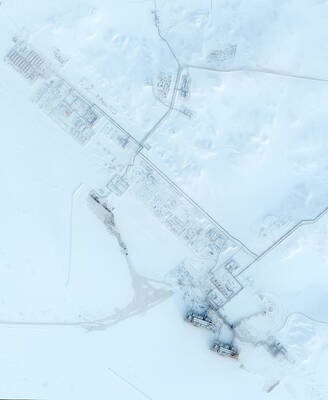Israel's army chief has exposed deep divisions between the military and Prime Minister Ariel Sharon by branding the government's hardline treatment of Palestinian civilians as counterproductive and saying that the policy intensifies hatred and strengthens "terror organizations."
Lieutenant General Moshe Ya'alon also told Israeli journalists in an off-the-record briefing that the army was opposed to the route of the "security fence" through the West Bank.
The government also contributed to the fall of the former Palestinian prime minister Ahmoud Abbas, by offering only "stingy" support for his attempts to end the conflict, he said.
Ya'alon had apparently hoped his anonymous criticisms would strengthen the army's voice, which has been subordinated to the views of the intelligence services in shaping policy.
But the comments were so devastating that he was swiftly revealed as the source.
The statements -- which a close associate characterized to the Israeli press as warning that the country was "on the verge of a catastrophe" -- will also reinforce a growing perception among the public that Sharon is unable to deliver the peace with security he promised when he came to office nearly three years ago.
The criticism is made all the more searing because Ya'alon is not known for being soft on the Palestinians. As deputy chief of staff, he described the latest conflict as the second stage of Israel's independence war.
The general warned that the continued curfews, reoccupation of towns and severe restrictions on the movement of Palestinians, combined with the economic crisis they have caused, were increasing the threat to Israel's security.
"In our tactical decisions, we are operating contrary to our strategic interest," Ya'alon said. "It increases hatred for Israel and strengthens the terror organizations."
Earlier this week, army commanders in the West Bank told a meeting of the military administration in the occupied territories that Palestinians had reached new depths of despair, which was fuelling hatred for Israel that had little to do with the propaganda so often blamed by the government.
"There is no hope, no expectations for the Palestinians in the Gaza Strip, nor in Bethlehem and Jericho," Ya'alon said.
The commanders warned that the situation was strengthening Hamas, a view the Israeli intelligence services agreed with.
But while the army sees the solution as easing most oppressive elements of occupation, the Shin Bet argues that growing support for Islamist groups is a reason to keep the clampdown in place. This is the preferred option of the defense minister and Ya'alon's predecessor as army chief of staff, Shaul Mofaz.
Sharon and Mofaz were reportedly furious at the general's statements and initially demanded that he retract them or resign. But the political establishment apparently decided it would be a better tactic to deride Ya'alon.
Anonymous sources in the prime minister's office were quoted in the Israeli press complaining that the army chief was trying to blame the politicians for the military's failures.
But army radio reported on Thursday that the Foreign Minister Silvan Shalom agreed that there needs to be a substantial easing of restrictions on the Palestinian population.
Deputy Prime Minister Ehud Olmert was also reported to have backed the general's view.
Ya'alon also waded into one of the most contentious issues of the day by saying the army had recommended a less controversial route for the steel and concrete "security fence" through the West Bank.

VENEZUELAN ACTION: Marco Rubio said that previous US interdiction efforts have not stemmed the flow of illicit drugs into the US and that ‘blowing them up’ would US President Donald Trump on Wednesday justified a lethal military strike that his administration said was carried out a day earlier against a Venezuelan gang as a necessary effort by the US to send a message to Latin American cartels. Asked why the military did not instead interdict the vessel and capture those on board, Trump said that the operation would cause drug smugglers to think twice about trying to move drugs into the US. “There was massive amounts of drugs coming into our country to kill a lot of people and everybody fully understands that,” Trump said while hosting Polish President

Japan yesterday heralded the coming-of-age of Japanese Prince Hisahito with an elaborate ceremony at the Imperial Palace, where a succession crisis is brewing. The nephew of Japanese Emperor Naruhito, Hisahito received a black silk-and-lacquer crown at the ceremony, which marks the beginning of his royal adult life. “Thank you very much for bestowing the crown today at the coming-of-age ceremony,” Hisahito said. “I will fulfill my duties, being aware of my responsibilities as an adult member of the imperial family.” Although the emperor has a daughter — Princess Aiko — the 23-year-old has been sidelined by the royal family’s male-only

A French couple kept Louise, a playful black panther, in an apartment in northern France, triggering panic when she was spotted roaming nearby rooftops. The pair were were handed suspended jail sentences on Thursday for illegally keeping a wild animal, despite protesting that they saw Louise as their baby. The ruling follows a September 2019 incident when the months-old feline was seen roaming a rooftop in Armentieres after slipping out of the couple’s window. Authorities captured the panther by sedating her with anesthetic darts after she entered a home. No injuries were reported during the animal’s time on the loose. The court in the

Another tanker carrying liquefied natural gas from Russia’s sanctioned Arctic LNG (liquefied natural gas) 2 project has docked in a Chinese port, ship-tracking data showed, days after Russian President Vladimir Putin met Chinese President Xi Jinping (習近平) in Beijing. The London Stock Exchange Group (LSEG) tracking data indicated the Russian Voskhod LNG tanker was anchored at an LNG terminal in the port of Tieshan in Guangxi, China. The Russian flagged tanker, with a cargo of 150,000 cubic meters of LNG, was loaded up at the Arctic LNG 2 facility in Gydan in northern Siberia on July 19, LSEG data showed.